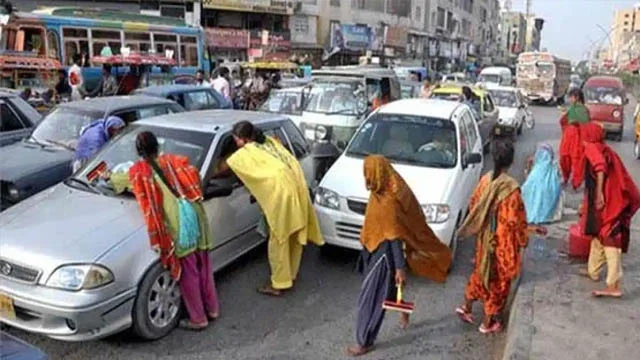- Web Desk
- Feb 19, 2026
Karachi flooded with beggars as Eid approaches
-

- Syed Raza Hassan
- Mar 29, 2025

KARACHI: Every year, thousands of beggars’ flock to Karachi, Pakistan’s commercial hub, to take advantage of the Eid-ul-Fitr season.
The holy month of Ramazan, followed by Eid, is considered the most profitable time for panhandlers. They arrive in large numbers from different parts of the country, particularly from South Punjab, to seek alms from the city’s residents.
Beggars of all ages and genders crowd streets, traffic signals, and shopping centres, urging people to give charity. Many also go door-to-door in residential areas, asking for financial aid.
Dozens of professional beggars arrested for pestering tourists
This year, the number of beggars in Karachi is expected to surpass 400,000, as the previous year saw an estimated 300,000 to 400,000 panhandlers in the city, according to a former Karachi police chief.
CRACKDOWN ON BEGGARS
Despite the massive influx, current Additional IG Karachi Javed Alam Odho refrained from estimating the number of beggars but shared police data showing that 263 cases were registered, and 640 beggars were detained in 2025. During Ramadan alone, 55 cases were lodged, and 152 panhandlers were arrested.
The city administration has launched its annual campaign against professional beggars, rounding them up and transferring them to Edhi Homes. Within a week, 44 beggars were detained; 27 from District Malir, eight from South, seven from East, and two from Korangi. Officials say the numbers continue to rise as the operation expands.
“The cleanup operation is necessary due to the increasing number of beggars during Ramadan and Eid,” Karachi Commissioner Syed Hassan Naqvi told Hum News English. However, he admitted that Karachi lacks a dedicated rehabilitation center for beggars, making long-term solutions difficult.
COURT ORDERS
In January, the Sindh High Court (SHC) directed Karachi’s traffic police to take action against beggars at traffic signals. A two-member bench, comprising Justice Mohammad Karim Khan Agha and Justice Adnan-ul-Karim Memon, heard a petition by Sumaira Mohammadi regarding beggars harassing people in public places.
The court ordered the Inspector General of Traffic Police to “ensure that no begging is allowed in Karachi by any individuals, whether male, female, child, or transgender.” However, enforcement remains weak due to the limited capacity of law enforcement agencies.
BEGGARS TRAVEL OVERSEAS
The issue of professional beggars has now extended beyond Pakistan’s borders. In recent years, a significant number of Pakistani beggars have been deported from Middle Eastern countries, including Saudi Arabia and Iraq, where they travel during Eid and Ashura to earn in foreign currency.
Following complaints from Gulf and Iraqi officials, Pakistan’s Federal Investigation Agency (FIA) has started intercepting panhandlers posing as families at airports. In November last year, then-Interior Minister Mohsin Naqvi revealed that 4,300 beggars were placed on the Exit Control List (ECL) as part of a zero-tolerance policy against those heading to Saudi Arabia.
BEGGING BECOMES A PROFESSION
Begging has evolved into an organised profession in Karachi, with territorial disputes becoming common. Last year, an unusual case made headlines when a female beggar approached the court after being threatened by rival panhandlers.
Ameer Khatoon, a long-time beggar at a sidewalk in Saeedabad, Baldia Town, filed a petition claiming that a rival group threatened her at gunpoint to vacate her usual spot. Seeking legal intervention, she requested an FIR against them.
The case, which unfolded like a courtroom drama, was dismissed by Judge Sohail Ahmed Mashori. He ruled that sidewalks cannot be owned, even by beggars. “This is not a property dispute but a matter of personal rivalry,” the judge remarked. He emphasised that while he sympathised with their struggles, the law could not determine who gets to beg where.
Judge Mashori urged society to seek long-term solutions for poverty and homelessness instead of allowing people to fight over begging spots. Although the case was dismissed, it highlighted the deep-rooted issue of professional begging and its organised nature in Karachi.




